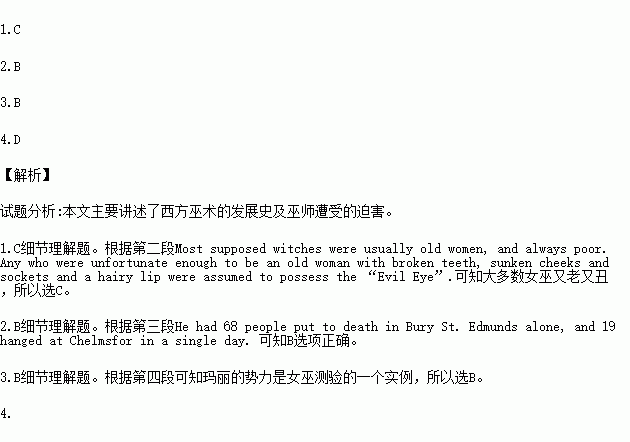题目内容
Witchcraft(巫术)was not made a capital offence in Britain until 1563 though it was disapproved by Pope Innocent VIII in 1484. From 1484 until around 1750, some 200,000 witches(女巫)were burnt or hanged in Western Europe.
Most supposed witches were usually old women, and always poor. Any who were unfortunate enough to be an old woman with broken teeth, sunken cheeks and sockets and a hairy lip were assumed to possess the “Evil Eye”. It was more the case if they also had a cat. Many unfortunate women were taken away on this sort of evidence and hanged.
Witch fever held East Anglia for 14 terrible months between 1645—1646. A man called Matthew Hopkins, an unsuccessful lawyer, contributed a lot! He became known as the “Witchfinder General”. He had 68 people put to death in Bury St. Edmunds alone, and 19 hanged at Chelmsfor in a single day. After Chelmsford he set off for other countries. Much of Matthew Hopkins theories of telling a witch were based on Devil’s Marks. He took a small mark to be a Devil’s Mark and he used his “needle” to see if these marks were insensitive to pain. His “needle” was basically a trick so the unfortunate women never felt any pain.
There were other tests for witches. Mary Sutton of Bedford was put to the swimming test. With her thumbs tied to opposite big toes she was thrown into the river. If she floated she was guilty; if she sank, innocent. Poor Mary floated!
Though many of the acts againsts witchcraft were put to an end in 1736, witch hunting still went on. In 1863, a suspected male witch was drowned in a pond in Headingham, Essex and 1945 the body of an elderly farm laborer was found near the village of Meon Hill in Warwickshire. His throat had been cut and his body was pinned to the earth. The murder remains unsolved; however, the man was said, locally, to be a male witch. It seems that belief in witchcraft has not entirely died out.
1.A female witch was often found to be ________
A. a young lady B. a lucky woman
C. an ugly woman D. a blind girl
2.Matthew Hopkins can be best described as __________
A. kind and smart
B. tricky and merciless
C. successful and nice
D. famous and fortunate
3.Why did people throw Mary into the river?
A. To take her life.
B. To tell if she was a witch
C. To test her swimming skills.
D. To prove that she was guilty
4.What’s the main idea of the last paragraph?
A. Witches are still badly treated all over the world.
B. Witches were terribly treated in the European history.
C. Some people still have been using magic in daily lives.
D. There have always been people believing in witchcraft
 名校课堂系列答案
名校课堂系列答案
